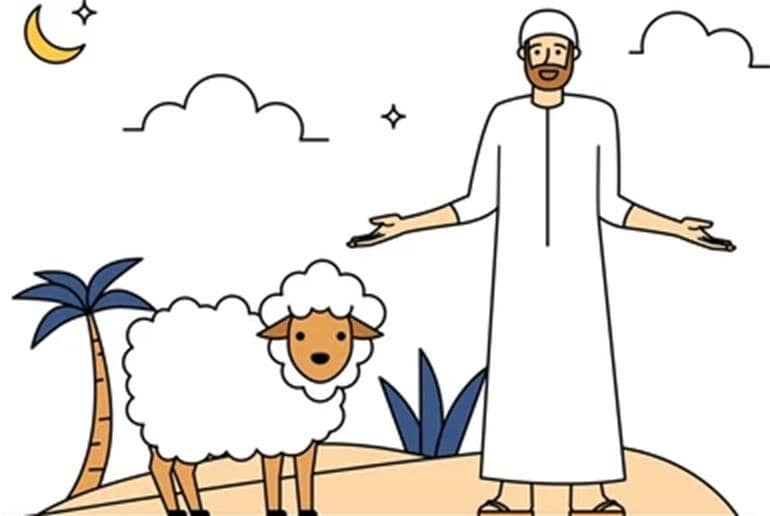Understanding the Significance of Udhiyah and Qurbani
During the blessed days of Eid al-Adha, Muslims around the world participate in a cherished tradition – the sacrifice of an animal. This act of worship, filled with deep meaning and generosity, is often referred to as both Udhiyah and Qurbani. But are they one and the same, or are there subtle differences? Let’s delve into the significance of both Udhiyah and Qurbani, exploring their purpose and the Islamic rulings surrounding them.
What is Udhiyah?
Udhiyah is an Arabic word that translates to “sacrifice.” In the context of Eid al-Adha, it refers specifically to the sacrifice of a sheep, goat, cow, or camel made for the sake of Allah (SWT). The act of Udhiyah commemorates Prophet Ibrahim’s (AS) unwavering faith and willingness to sacrifice his son Ismail (AS) as an act of obedience to Allah’s (SWT) command. Ultimately, Allah (SWT) spared Ismail (AS) and provided a ram in his place. Udhiyah embodies our submission to Allah’s (SWT) will and serves as a reminder of the immense blessings He bestows upon us.
The Importance of Sharing: Distributing the Udhiyah Meat
A central aspect of Udhiyah is the distribution of the sacrificed animal’s meat. Traditionally, the meat is divided into three parts: one-third for your family, one-third for relatives and friends, and one-third for the poor and needy. Sharing the meat fosters a spirit of compassion and strengthens bonds within the community. It ensures that everyone has the opportunity to partake in the festivities and experience the joy of Eid al-Adha. Of course, this distribution can be different, just as in Hajj, pilgrims donate all the meat to the needy, you can also donate all the meat to the needy.
Is Udhiyah Wajib (Mandatory) or Mustahab (Recommended)?
There are two main scholarly opinions regarding the ruling on Udhiyah. Some scholars consider it wajib (mandatory) for those who can financially afford it. Others view it as mustahab (highly recommended) but not obligatory. Regardless of the specific ruling, there’s a strong emphasis on performing Udhiyah if you have the means. It’s a chance to express gratitude for Allah’s (SWT) countless blessings and fulfill a cherished tradition of our faith.
What is Qurbani?
Qurbani, a term with Urdu and Persian roots, also translates to “sacrifice” and carries the same meaning as Udhiyah in the context of Eid al-Adha. It signifies the act of sacrificing an animal during the designated days of Eid al-Adha. Just like Udhiyah, Qurbani commemorates Prophet Ibrahim’s (AS) unwavering faith and his willingness to make the ultimate sacrifice.
The Qur’an and Sacrifice
The concept of sacrifice, though not explicitly mentioned as Udhiyah or Qurbani, is alluded to in several verses of the القرآن (Qur’an). One such instance is in Surah Al-Saffat, verses 100-107, which narrate the story of Prophet Ibrahim’s (AS) dream and his unwavering willingness to sacrifice his son. The verses don’t mention a specific term for the sacrifice, but the context clearly refers to the act of offering an animal in obedience to Allah’s (SWT) command.
The specific verses in Surah Al-Baqarah that talk about sacrificing in Hajj aren’t directly mentioned by mentioning the act as “Udhiyah” or “Qurbani.” However, they discuss the rituals and guidelines surrounding these sacrifices.
Here’s a refined passage incorporating this point:
“There are also verses in the second Surah, Al-Baqarah, which consists of 286 verses, that allude to sacrifices during Hajj. While not explicitly mentioning Udhiyah or Qurbani, these verses discuss the rituals and guidelines surrounding the animals offered as sacrifices. They provide a broader framework for understanding the significance of sacrifice within Islamic practice, including the context of Eid al-Adha.”
If you’d like to explore the specific verses yourself, some potential starting points based on general themes could be:
- Verses 67-69: These verses discuss acceptable and unacceptable offerings for sacrifice.
- Verses 158-160: These verses touch upon fulfilling vows and obligations related to sacrifice during Hajj.
- Verses 196-199: This section covers situations that might prevent pilgrims from completing Hajj and mentions alternatives involving sacrifice.
It’s important to note that scholars may have different interpretations regarding the exact verses that apply to sacrifice in Hajj.
Are Udhiyah and Qurbani Exactly the Same?
YES, While both Udhiyah and Qurbani represent the sacrifice of an animal during Eid al-Adha, there’s a subtle difference in their usage. Udhiyah is primarily an Arabic term, and Qurbani is more prevalent in regions with Urdu and Persian influences. In essence, they represent the same act of worship, but the specific word choice might vary depending on the language and region.
The Importance of Fulfilling Udhiyah or Qurbani
Whether you refer to it as Udhiyah or Qurbani, the act of sacrificing an animal during Eid al-Adha holds immense significance. It’s a way to:
- Commemorate Prophet Ibrahim’s (AS) unwavering faith and obedience.
- Express gratitude to Allah (SWT) for His countless blessings.
- Share your blessings with those less fortunate.
- Strengthen community bonds and foster compassion.
We at Our Islamic Charity encourage you to consider fulfilling the tradition of Udhiyah or Qurbani this Eid al-Adha. Your sacrifice can bring immense joy to families in need and contribute to a more compassionate and fulfilling Eid experience for everyone.



